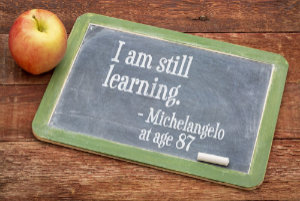Coaching begins with self-awareness but quickly moves into awareness of your client on many levels. Here your own powers of observation need to be honed. The first challenge is just to observe, to notice, and just to notice. Once again don’t play detective looking for the “real meaning” of those arms folded across your client’s chest. This is about listening with your whole person, not just your ears. Notice your client’s nonverbal signals (even the vocal ones that come through on a telephone) and rather than interpret either file them away for future reference, or feed them back to your client. “I notice that each time you’ve referred to your boss today your voice gets louder and sharper.” You’ll also find that when you “just notice” without judgment, or trying hard to figure it all out, you naturally are less critical and your client feels more supported.
Be aware of your client’s context. Did they just rush to see you after begging their reluctant supervisor for the time? Are they not entirely present with you because of stress and worries about what is next? Inquire so you will understand where they are at, where they are coming from. Affirm their experience, be compassionate and check out their ability to engage with you right now.
As your client tells their story, checks in on commitments they made for the week, etc., be aware of patterns that emerge and feed those back to your client. This is often were great insights are born.
Be aware of your client’s expression of energy. What are they passionate about? What sounds flat? Follow the energy by paraphrasing and reflecting what you are hearing (matching the energy in your own voice as you do), and by asking powerful questions where the energy is highest.
Be aware of your client’s emotional expression. This is partly about “following the energy”, but also a barometer of motivation and perhaps even the need for referral. Sustaining motivation for lifestyle improvement is a long-term challenge. If your client’s enthusiasm for an area of focus has faded, if they don’t seem to “buy in” to the effort as much anymore, check it out. You’ll be tipped off by your own awareness of their emotional expression regarding that area they are working on. You’ll also need to always be aware of the emotional qualities of affect that point out the need for referral to counseling rather than coaching. See the ICF’s “Top Ten Reasons For Referral” (http://www.lifecoachtraining.com/resources/articles/articles/GearShift.pdf)













